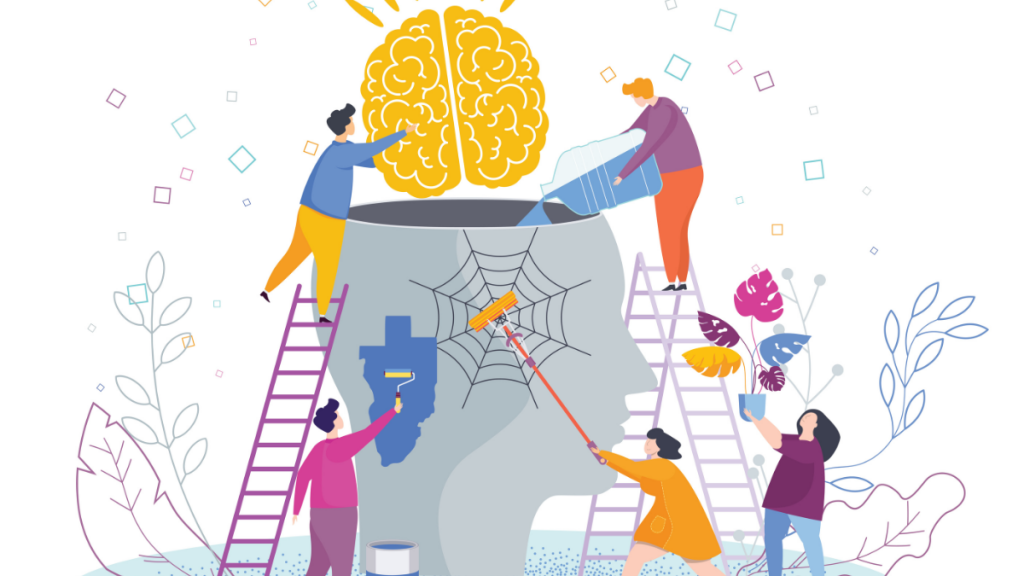The Self-Cleaning Brain
04/24/2023
By Molly Rose Teuke
“I need to clear my head.” Or “I need to sweep the cobwebs out of my brain.” I bet you say something like this to yourself fairly often. To address the problem, you may take a few minutes to organize your thoughts on paper, switch mental gears or simply take a break. Such efforts may offer relief in the moment, but at best, they’re effective only on a surface level, kind of like straightening up the papers on your desk.
The truth is the need to clean up your brain is biological and ongoing, and we’re not talking a brief dusting and tidying up. Your brain needs a deep clean and it needs it every day. Given its complex job — sending nonstop electrical signals along hundreds of miles of neural wiring made up of microscopically tiny neurons (brain cells) — it’s no wonder it needs a daily scrub. Fortunately, nature has devised some ingenious processes for deep-cleaning your gray matter.
But we are only now beginning to understand the whys and wherefores of how that happens.
Before the development of sophisticated imaging technologies, studying the brain was difficult at best. It’s only been in recent decades, as imaging technologies have advanced, that we’ve begun to unravel the brain’s mysteries.
Until a decade or so ago, no one understood quite how the brain kept itself healthy. Your central nervous system isn’t plugged into your body’s lymphatic system, which cleanses tissues of metabolic waste and other potentially harmful substances, for example.
THE GLYMPHATIC SYSTEM
In 2012, researchers discovered an anatomical pathway for cleansing the brain’s cerebrospinal fluid. The research team, led by Maiken Nedergaard, co-director of the University of Rochester’s Center for Translational Neuromedicine, called this system the glymphatic system because it functions somewhat like the lymphatic system and relies on glial cells.
In January of this year, Science magazine reported another discovery: the existence of a previously unknown anatomical feature of the brain called the subarachnoidal lymphatic-like membrane (SLYM). This thin, tight barrier appears to keep new and “clean” cerebrospinal fluid from being contaminated by older, “dirty” fluid that contains waste picked up by the glymphatic system.
Glia is Greek for glue, and glial cells, which make up about half of all the cells in your brain and spinal cord, were once thought to simply hold neurons in place — a kind of neuronal scaffolding.
It turns out that there are several types of glial cells and they have far more sophisticated functions. Most of them serve in some way on your brain’s maintenance and clean-up crew; several of them specialize in removing damaged neurons, pathogens and other potentially damaging debris, much like a Zamboni removes debris from and cleans an ice rink.
As such, the breakdown of the glymphatic system is thought to play a significant role in the development of Alzheimer’s disease, and other types of dementia and neurodegenerative disease.
SUPPORT YOUR BRAIN WITH A HEALTHY LIFESTYLE
The magic of glial cells notwithstanding, your brain needs a solid bodily foundation to keep it humming night after night. Establishing good habits helps keep your brain’s maintenance crews functioning smoothly, leading to consistently reliable and resilient cognitive function, including faster processing and better memory.
SLEEP
Nearly all cleanup and repair occurs during sleep, and this is when glial cells show one of the more amazing features of their performance. They shrink, opening a wider pathway for the neural Zambonis to do their job. The speed at which these clean-and-repair operations can occur significantly increases as the flow-through rate increases thanks to wider pathways.
Your brain’s glymphatic system is 10 times more active during sleep than during wakefulness. Imagine that your car, which cruises along at 60 MPH in the afternoon, is suddenly able to accelerate to 600 MPH without a ruffle — but only at night. That’s how much more powerfully your glymphatic system operates while you sleep.
The key to good sleep is routine. A consistent sleep time and wake time is one of the best ways to ensure a good night’s sleep. Without that consistency, your brain doesn’t know when to send sleepy time signals and when to begin preparing your body for its wake-up cycle.
EXERCISE
When your heart is pumping vigorously, your blood is able to more easily move nutrients, oxygen and metabolic byproducts, which is important to keeping your lymphatic and glymphatic systems humming.
HYDRATE
You need a high volume of fluids to facilitate blood flow in the brain and elsewhere. Your brain lets you know fairly quickly if you’re not hydrating sufficiently: You’ll feel dizzy, fatigued, possibly disoriented and generally cranky. A quick way to ensure you’re getting enough fluids is to check the color of your urine. Under normal circumstances, it should be pale yellow or even colorless. If it’s a brighter yellow, reach for your water bottle.
EAT THOUGHTFULLY
Your brain is just 2% of your body weight and yet it consumes some 20% of your calories. A diet of colorful and varied foods ensures that you’re getting enough of the right nutrients to function optimally.
Certain nutrients are critical to improving the processing speed of your brain (lutein), reducing inflammation (DHA omega-3), breaking down harmful substances so they can be washed away (some of the B vitamins), and producing positive mood-regulating neurotransmitters (Vitamin D). A good rule of thumb for grocery shopping is to fill your cart with more whole foods, fewer processed foods, and plenty of fruits and veggies.
Also consume plenty of fiber. According to Dr. Ilene Ruhoy, a neurologist writing at mindbodygreen.com, keeping your digestive system operating well is key to good brain health. She says, “When the body has to divert much of its energy to digesting, absorbing, and cleaning and moving your sluggish bowels, there is less energy to support the bioenergetics of glymphatic drainage.”
CLEAN LIVING, CLEAN BRAIN
The next time you think “I need to clear my head” or “sweep the cobwebs out of my brain,” remind yourself that a healthy body supports a healthy brain and commit to following a brain-friendly lifestyle. And, most importantly, get a good night’s sleep. Chances are, you’ll wake up refreshed and clear-headed.
Molly Rose Teuke has an enduring curiosity about what makes our brains tick. Pre-COVID-19, she delivered brain-based leadership training for the NeuroLeadership Institute, a global leader in the performance arena. She now teaches a two-part program for Nicolet College called Your Brain: The Owner’s Manual, and also hosts a weekly classical music program on WXPR-FM. You can reach her at [email protected].











